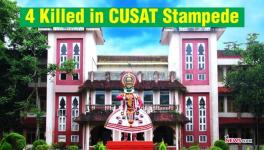Go Home, No Scam Here

Newsclick Image by Sumit Kumar
The ‘2G case’, decided in a ‘special court’ at Patiala House, consisted of three cases filed by the CBI and the ED. The two CBI cases were CBI v A Raja and Others and CBI v Ravi Kant Ruia and Others. The ED case was ED v A Raja and Others. The issues before the court in CBI v A Raja and Others was whether there was collusion on the part of A Raja and Shahid Balwa, Vinod Goenka, and Sanjay Chandra in the process for granting Unified Access Service Licenses (UASL). The issue in CBI v Ravi Kant Ruia and Others was whether Loop Telecom Limited acted as a front company for Essar Telecom Limited in obtaining 21 UASL in contravention of the Telecom Rules. In ED v A Raja and Others the issue was whether the 200 crore which was transferred between Swan Telecom (P) Limited, Dynamix Realty, Kusegaon Realty (P) Limited, and Cineyug Media & Entertainment (P) Limited to Kalaignar TV (P) Limited, amounted to being ‘proceeds of a crime’.
In CBI v A Raja and Others, the Court appears to have taken the statements given by A Raja at face value, and not considered the documentary evidence presented. The Court appears to have begun with the presumption that the tendering process was not suspicious in any way. This seems strange, given that the Supreme Court held, in its 2012 Judgement, that spectrum is a ‘national resource’ and any tendering process must be held in line with Article 14 (Right to Equality), in a fair and transparent manner. The Judgment delivered by the special court found that there was no evidence that A Raja had colluded with corporate entities to influence policy decisions, even though statements supporting this fact had been made by a witness who was A Raja’s personal secretary. The statements of the witness were disregarded by the Court. The crux of the Judgement was that the process of changing first to apply to first to comply was merely an administrative error on the part of junior officials and that A Raja, who was heading the Ministry could not be at fault. Therefore, in two parts the Court dismissed collusion of those accused and the act of changing what was already an opaque process for licensing into an even murkier one.
The Supreme Court Judgement in 2012 clearly stated that spectrum is a ‘national resource’ and like in the case for assigning mining rights, a fair and transparent tendering process must take place. The crux of this logic was that a national resource is one that is owned by the people and held by the government for the benefit of the people. In this light, the process for allocating rights to use this resource must be Constitutionally valid. This means that the process must follow from Article 14 which is the right to equality, and that all bids must be treated the same. That the Judgement of the Special Court treated the first to apply, and its change to the first to comply policy as being valid is strange to say the least.
In CBI v Ravi Kant Ruia and Others the Court applied a very strict reading of the Telecom Rules. The main part being that “no single company/legal person, either directly or through its associates, shall have substantial equity holding in more than one licensee company in the same service area for the same service. ‘Substantial equity’ herein will mean ‘an equity of 10% or more’. A promoter company cannot have stakes in more than one licensee company for the same service area.” The issue that the prosecution argued was that equity must be understood as being financially in control of the licensee company. The Court however, took equity to mean ‘shares’, which in a strictly financial sense is correct. Debentures or preferential shares are not the same as equity. Yet instead of looking into who effectively controlled the company the Court adopted a strict reading of ‘equity’ which otherwise would have barred the companies from applying for new licenses. The surprising part of the Judgement was on page 376 where it was stated that “Sh I. P. Khaitan is a man of means … In the face of such copious evidence it cannot be said that Sh I. P. Khaitan was a front or benami for Essar group for purchase of BPL group of companies.” It was on this basis that the Court dismissed the allegations that Loop Telecom was a front company created to purchase licensee companies on behalf of the Essar Group. This was despite members of the Essar Group served on the board of directors for Loop Telecom.
In the ED case, ED v A Raja and Others the Judgement was most surprising. The prosecution had clearly shown that the dates for the transfer of funds amounting in total 200 crore from Dynamix Realty to Kusegaon Fruits and Vegetables to Cineyug Films to Kalaignar TV corresponded very closely. Some of the transfers amounting 10 crore even took place on the same day. In this light, the position of the defence that these were ‘investment payments’ seems most unusual. What made the transfer of funds even more unusual was the ‘reverse flow’ soon after the Supreme Court Judgement in 2012. All the funds travelled back to Dynamix Realty in the form of ‘interest payments’. Yet as mentioned by the prosecution, this was done in the absence of any formal understanding in the form of a legal document. To a lay person, the question would be ‘who conducts business to the tune of hundreds of crores without any legal documents?’ The Court in this case appears to have adopted the logic that since there was no collusion, there was no crime, and since there was no crime, the payments are not ‘proceeds of crime’, and therefore the 200 crores paid were not illegal gratification. This logic is contrary to the established logic regarding money laundering, where payments in excess of services or goods rendered are considered evidence of a crime having been committed.
Regarding the strict reading of ‘equity’, the fact that the Special Court in this case was a Court of first instance allows some room for leniency. Courts of first instance, barring High Courts and the Supreme Court, generally do not interpret the law as much as they apply it. But refusing to acknowledge at least that Essar Group was in de facto control of Loop Telecom and Reliance’s control of Swan Telecom, goes beyond a strict reading of ‘equity’. Further, the Court also refused to acknowledge that A Raja had known the co accused from his time as Minister for Environments and Forests, despite family members of A Raja being on the board of Green House Promoters — a realty company that had done the due diligence for DB Group of which Dynamix Realty was a part.
Get the latest reports & analysis with people's perspective on Protests, movements & deep analytical videos, discussions of the current affairs in your Telegram app. Subscribe to NewsClick's Telegram channel & get Real-Time updates on stories, as they get published on our website.
























